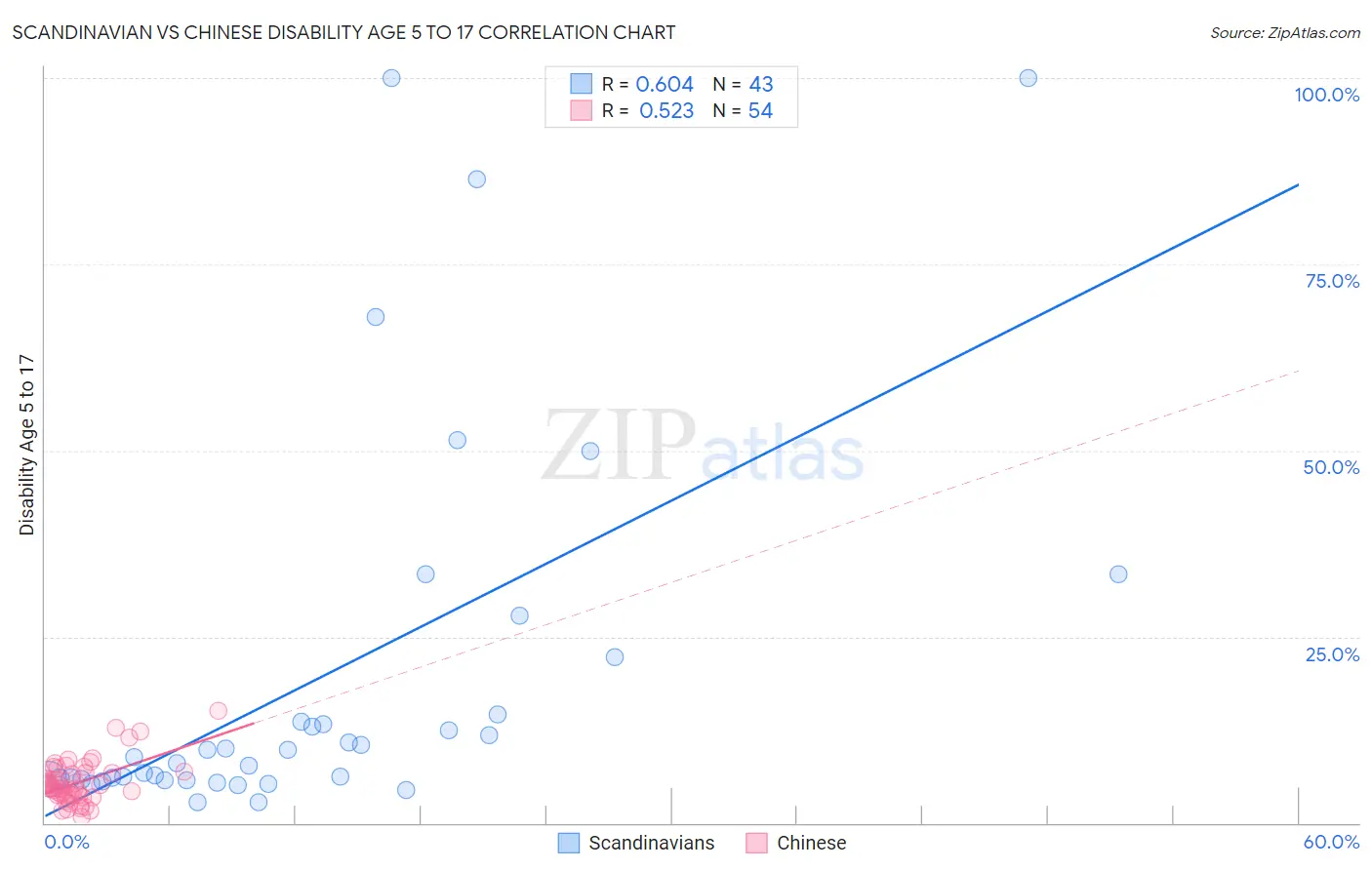Scandinavian vs Chinese Disability Age 5 to 17
COMPARE
Scandinavian
Chinese
Disability Age 5 to 17
Disability Age 5 to 17 Comparison
Scandinavians
Chinese
5.9%
DISABILITY AGE 5 TO 17
1.4/ 100
METRIC RATING
253rd/ 347
METRIC RANK
4.7%
DISABILITY AGE 5 TO 17
100.0/ 100
METRIC RATING
15th/ 347
METRIC RANK
Scandinavian vs Chinese Disability Age 5 to 17 Correlation Chart
The statistical analysis conducted on geographies consisting of 465,927,365 people shows a significant positive correlation between the proportion of Scandinavians and percentage of population with a disability between the ages 5 and 17 in the United States with a correlation coefficient (R) of 0.604 and weighted average of 5.9%. Similarly, the statistical analysis conducted on geographies consisting of 64,726,058 people shows a substantial positive correlation between the proportion of Chinese and percentage of population with a disability between the ages 5 and 17 in the United States with a correlation coefficient (R) of 0.523 and weighted average of 4.7%, a difference of 25.5%.

Disability Age 5 to 17 Correlation Summary
| Measurement | Scandinavian | Chinese |
| Minimum | 2.7% | 0.88% |
| Maximum | 100.0% | 15.0% |
| Range | 97.3% | 14.1% |
| Mean | 19.3% | 5.4% |
| Median | 8.8% | 4.9% |
| Interquartile 25% (IQ1) | 5.8% | 3.7% |
| Interquartile 75% (IQ3) | 14.5% | 6.7% |
| Interquartile Range (IQR) | 8.7% | 3.0% |
| Standard Deviation (Sample) | 25.4% | 2.9% |
| Standard Deviation (Population) | 25.1% | 2.8% |
Similar Demographics by Disability Age 5 to 17
Demographics Similar to Scandinavians by Disability Age 5 to 17
In terms of disability age 5 to 17, the demographic groups most similar to Scandinavians are Honduran (5.9%, a difference of 0.070%), Immigrants from Cambodia (5.9%, a difference of 0.090%), Barbadian (5.9%, a difference of 0.10%), Polish (5.9%, a difference of 0.11%), and Italian (5.9%, a difference of 0.17%).
| Demographics | Rating | Rank | Disability Age 5 to 17 |
| Tlingit-Haida | 1.9 /100 | #246 | Tragic 5.9% |
| Immigrants | Honduras | 1.8 /100 | #247 | Tragic 5.9% |
| British | 1.7 /100 | #248 | Tragic 5.9% |
| Immigrants | Ghana | 1.7 /100 | #249 | Tragic 5.9% |
| Poles | 1.5 /100 | #250 | Tragic 5.9% |
| Immigrants | Cambodia | 1.5 /100 | #251 | Tragic 5.9% |
| Hondurans | 1.5 /100 | #252 | Tragic 5.9% |
| Scandinavians | 1.4 /100 | #253 | Tragic 5.9% |
| Barbadians | 1.3 /100 | #254 | Tragic 5.9% |
| Italians | 1.2 /100 | #255 | Tragic 5.9% |
| Hopi | 1.0 /100 | #256 | Tragic 5.9% |
| Hispanics or Latinos | 1.0 /100 | #257 | Tragic 5.9% |
| Brazilians | 0.9 /100 | #258 | Tragic 5.9% |
| Slavs | 0.9 /100 | #259 | Tragic 5.9% |
| Somalis | 0.8 /100 | #260 | Tragic 5.9% |
Demographics Similar to Chinese by Disability Age 5 to 17
In terms of disability age 5 to 17, the demographic groups most similar to Chinese are Immigrants from Korea (4.7%, a difference of 0.20%), Immigrants from Singapore (4.7%, a difference of 0.42%), Arapaho (4.7%, a difference of 0.88%), Immigrants from South Central Asia (4.7%, a difference of 0.90%), and Thai (4.7%, a difference of 0.91%).
| Demographics | Rating | Rank | Disability Age 5 to 17 |
| Indians (Asian) | 100.0 /100 | #8 | Exceptional 4.6% |
| Immigrants | Eastern Asia | 100.0 /100 | #9 | Exceptional 4.6% |
| Immigrants | India | 100.0 /100 | #10 | Exceptional 4.6% |
| Armenians | 100.0 /100 | #11 | Exceptional 4.6% |
| Iranians | 100.0 /100 | #12 | Exceptional 4.6% |
| Thais | 100.0 /100 | #13 | Exceptional 4.7% |
| Immigrants | Korea | 100.0 /100 | #14 | Exceptional 4.7% |
| Chinese | 100.0 /100 | #15 | Exceptional 4.7% |
| Immigrants | Singapore | 100.0 /100 | #16 | Exceptional 4.7% |
| Arapaho | 100.0 /100 | #17 | Exceptional 4.7% |
| Immigrants | South Central Asia | 100.0 /100 | #18 | Exceptional 4.7% |
| Immigrants | Uzbekistan | 100.0 /100 | #19 | Exceptional 4.8% |
| Burmese | 100.0 /100 | #20 | Exceptional 4.8% |
| Yup'ik | 100.0 /100 | #21 | Exceptional 4.8% |
| Asians | 100.0 /100 | #22 | Exceptional 4.8% |